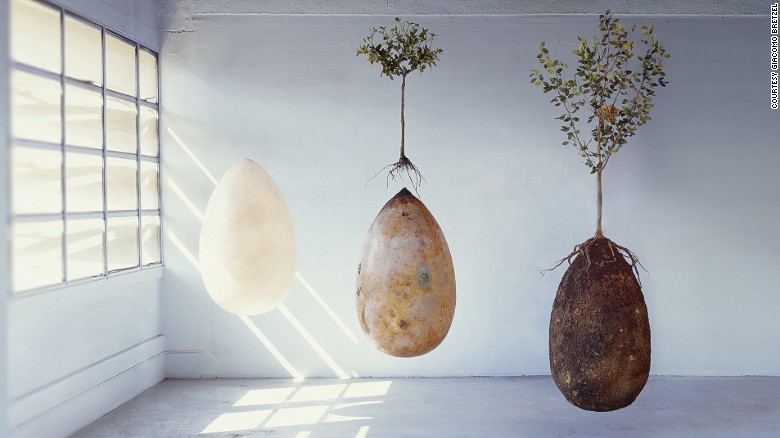The biodegradable burial pod that turns your body into a tree
By Paula Erizanu, CNN
Updated 7:44 AM ET, Wed May 3, 2017
(CNN) Your carbon footprint doesn't end in the grave.
While you rest in peace, the wood, the synthetic cushioning and the metals generally used in traditional coffins -- as well as the concrete around reinforced graves -- continue to litter the earth.
"A lot of energy also goes into producing these materials, which are used for a very short time and then buried. They're not going to break down very fast," says Jennifer DeBruyen, an Associate Professor of Biosystems Engineering and Soil Science at the University of Tennessee.
Italian designers Raoul Bretzel and Anna Citelli might have a solution. They call it Capsula Mundi -- "world's capsule" in Latin -- and it's an egg-shaped, organic casket that's suitable for ashes, too.
Once buried, they say, the biodegradable plastic shell breaks down and the remains provide nutrients to a sapling planted right above it.
Bretzel and Citelli believe that death is as closely related to consumerism as life. Their goal? To create cemeteries full of trees rather than tombstones, reduce waste, and create new life out of death.
The idea for the Capsula Mundi came in 2003, when the pair saw tons of furniture trashed at the end of Milan's famous design fair, "Salone del Mobile."
"It was a big competition to design new things, but almost nobody cared about future impact or whether anyone would actually use these things", Bretzel said.
"We started thinking about projects that could have an environmental aspect. Death is part of our life but at design fairs nobody cares about that because it's one side of our life that we don't want to look at. We don't like to think of death as part of life."
The science behind it
The designers are launching the first version of their product, which is for ashes only. A later model will be suitable for bodies, to be encapsulated in the fetal position.
Bacteria in the soil first break down the bio-plastic, then the ashes gradually come into contact with the soil, without changing its chemical balance too dramatically.
While the burial of ashes may be environmentally friendly, cremation has its critics: "It's a very energy-demanding process," says DeBruyen.
On top of that, older dental fillings can release polluting mercury, which is why some crematoriums have installed mercury filters.
Although sowing a seed on top of the Capsula may sound like an attractive concept, Jacqueline Aitkenhead-Peterson, Associate Professor in the Department of Soil and Crop Sciences at Texas A&M University, suggests more mature trees should be used.
"Because the body will purge within a year in a buried environment, the nutrients are released into the soil quite quickly, so a decently sized tree planted on top would be key. Capturing these nutrients is also important to protect groundwater," she said.
But would it really benefit the environment? DeBruyen seems to think so: "The problem with traditional burials is that they're completely anaerobic. The remains are buried deep and sealed in a coffin. There's a lot of incomplete degradation."
"These pods may help maintain some oxygen flow into the system. The other thing they bring to the whole system is carbon [from the starch-based bioplastic]. One of the constraints and challenges with decomposing a human body is that it's very nitrogen rich. And so, the microbes that are trying to break down all that nitrogen need some carbon to balance it out."
 http://www.cnn.com/2017/05/03/world/...ndi/index.html
http://www.cnn.com/2017/05/03/world/...ndi/index.html